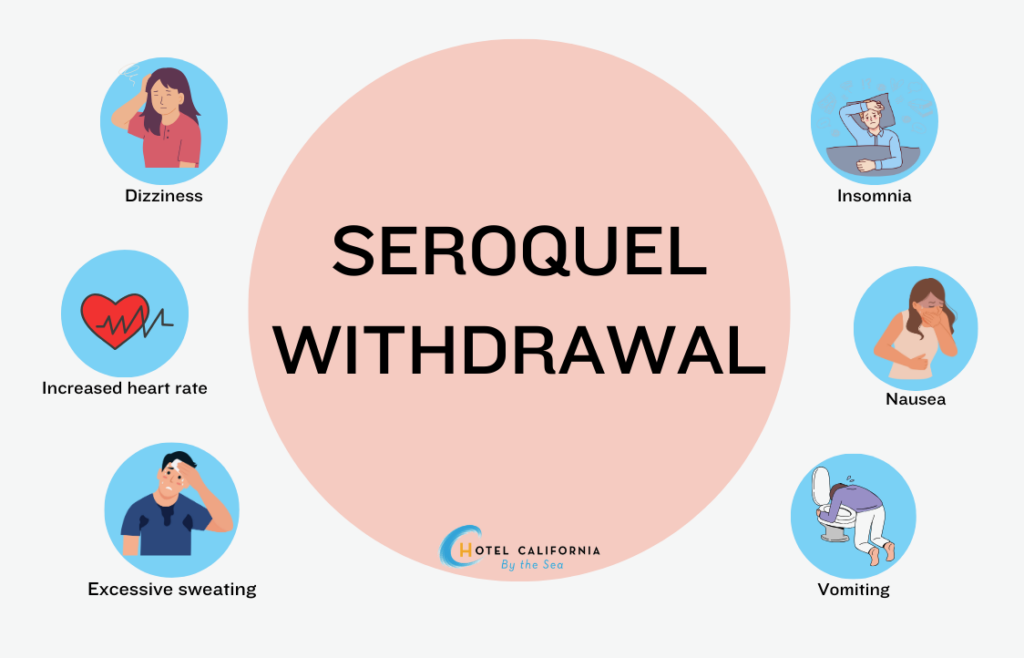Risks of antipsychotic medications: Seroquel Withdrawal
Seroquel, a second-generation antipsychotic medication is FDA-approved to treat conditions such as schizophrenia, acute manic episodes from bipolar disorder and adjunctive treatment for major depressive disorder. It is often referred to by its generic name quetiapine. It is also most often prescribed for off-label uses such as treating generalized anxiety disorder, psychosis, insomnia and symptoms of depression. Other mental health conditions that Seroquel is prescribed for include symptoms of obsessive-compulsive disorder (OCD), post-traumatic stress disorder (PTSD), restless leg syndrome, alcoholism and Tourette’s syndrome.
Research has found that disturbances in the flow of neurotransmitters are often linked with symptoms of psychosis. Examples of this include over-activity of the dopamine system, which is linked to experiencing hallucinations and delusions. These are all symptoms of psychotic disorders such as schizophrenia. Antipsychotic medications such as Seroquel help block the overstimulating dopamine and serotonin activity in the brain by controlling the levels of the neurotransmitters. These neurotransmitters are responsible for helping the body regulate mood, behaviors and thoughts.

The medication works by balancing the levels of dopamine and serotonin in the brain. It is very effective in helping to manage and prevent the reoccurrence of severe manic episodes and major depressive episodes. Seroquel has mood stabilizing properties that if taken over a long period of time, can lead to withdrawal symptoms once drug intake has abruptly stopped or slowed down. In other cases, the abuse of the antipsychotic medication can also lead to Seroquel overdose.
What is Substance Withdrawal?
Substance withdrawal is a term that describes a collection of symptoms, which occur as a result of a drug suddenly leaving your body. When the body has adapted to the presence of drugs and it has been abruptly taken away, it will have to immediately recalibrate and rebalance itself without the presence of those drugs that it has become accustomed to. Withdrawal implies that the body has become physically dependent on a drug. Sometimes withdrawal can be mild and last for a few days. In other cases, withdrawal can be dangerous, and life-threatening and require intense medication care from a clinical team.
Substance withdrawal is also very closely associated with addiction. However, these two terms and mechanisms are not synonymous. Withdrawal is a biological response to the body’s ability to readapt without the presence of drugs. Addiction is a psychological response to dependence on mind-altering drugs. Withdrawal can occur without the presence of addiction. However, during addiction, withdrawal symptoms are a common occurrence and often present alongside the mental health condition. The impact of your substance withdrawal experience will depend on what drug you have taken, how heavily you have taken the drug, your medical history and your individual medical health.

Seroquel Withdrawal
Seroquel withdrawal is not a common occurrence. However, there is a consensus among substance addiction clinicians that if a medication is taken for longer than several weeks, most psychotropic medications can lead to substance withdrawal. Seroquel withdrawal symptoms can last anywhere from a few days to a few months, depending on each individual person. The average duration of Seroquel withdrawal is about 1-3 days after initial use. When the body has adapted to the presence of Seroquel, it can take longer for the body to rebalance and return to a normal state once the drug has been removed from the system. This is when withdrawal symptoms can occur.
In some cases, withdrawal from Seroquel can be more challenging than detoxing from benzodiazepines. When Seroquel is reduced, the dopamine is impacted and can be enhanced. This causes symptoms of mania to return and bring an increased sense of reward to the brain.
Phases of Seroquel Withdrawal
New withdrawal is a phase in which symptoms set in at about 1-4 days after the last initial dose of the medication. Side effects such as nausea, abdominal pain and sleeping problems may develop. The symptoms during this phase are short-lasting and are typically over within a week.
Rebound withdrawal is a phase in which symptoms can occur within a 1-4 day period with emerging underlying symptoms that the medication was supposed to be treating. Sometimes during rebound withdrawal, symptoms can present more severe than the original condition being treated.
Persistent post-withdrawal disorder is a phase in which symptoms of withdrawal can persist past the 6-week mark after initially stopping the use of Seroquel.
Withdrawal Timeline
- Day 1-3: The initial onset of withdrawal symptoms include nausea, headache, dizziness and insomnia.
- Day 4-7: This stage is considered peak withdrawal with symptoms including anxiety, irritability, and mood swings.
- Week 2: During this stage, users can experience flu-like symptoms along with fatigue and sleep problems.
- Week 3-4: During this stage, users will see some gradual improvements in their physical symptoms. However, psychological symptoms such as depression can continue to persist.
- Month 2-3: During this part of Seroquel withdrawal, users can continue to experience psychological symptoms including anxiety and depression.
Check Your Insurance Coverage for FREE
Find out if your insurance covers addiction treatment in minutes. We accept most insurance!
Ways to cope with Seroquel Withdrawal
- Medication. Some over-the-counter medications can be taken to help treat mild symptoms.
- Try natural remedies such as ginger for upset stomach and digestion.
- Check in with your doctor or medical provider.
- Gradually taper off Seroquel to avoid intense withdrawal symptoms.
Seroquel Overdose
According to the Centers for Disease Control and Prevention (CDC), an estimated 192 people die each day from a drug overdose. Overdosing on Seroquel is uncommon and typically produces mild symptoms that can be treated. However, it can become dangerous when the medication is used along with other mind-altering substances. The CDC found that Seroquel was one of the most common drugs associated with suicide by drug overdose along with opioids and Xanax. In 2016, Seroquel was involved in about 300 suicide by drug overdose cases.
Overdose can occur when a person takes an excessive amount of Seroquel or if they take Seroquel in combination with other drugs. Overdose is also more likely to occur in people who have untreated mental health conditions.
The FDA recommends Seroquel does not go beyond a max dose of 800mg per day. However, the amount of the medication that can lead to overdose depends on each person as well as other factors including age, history of cardiovascular disease, impaired kidney or liver function, slow metabolism, body weight and the usage of other substances.
Signs and symptoms of Seroquel Overdose
- Seizures
- Coma
- Hypothyroidism
- Loss of cognitive and motor control
- Inability to regulate body temperature
- Dysphagia
- Rapid heartbeat
- Dizziness or fainting
- Vomiting
- Low blood pressure
Reach out to Hotel California by the Sea
We specialize in treating addiction and other co-occurring disorders, such as PTSD. Our Admissions specialists are available to walk you through the best options for treating your addiction.
Are you experiencing withdrawal symptoms? Do you need Substance Use Disorder Treatment?
Seroquel is a commonly prescribed antipsychotic medication often used to treat symptoms of schizophrenia as well as off-label treatment of anxiety and depression. Though dependence, overdose and addiction to this medication are not common, it can happen. Medications that affect dopamine, serotonin and other neurotransmitters can cause a user to become dependent and tolerant of the drug. Treating an addiction to substances is the most effective under the guidance of a behavioral health treatment program such as Hotel California by the Sea.
We offer all levels of care including detox, residential and outpatient programs. We use evidence-based treatment methods such as CBT, DBT and group therapy to help our clients get to the root cause of their addiction. Hotel California by the Sea is dedicated to helping our clients and providing the tools and resources they need to overcome their addictions.
References:
https://www.verywellmind.com/seroquel-withdrawal-5114540
https://www.alternativetomeds.com/blog/seroquel
https://my.clevelandclinic.org/health/drugs/19288-quetiapine-tablets
https://www.addictionresource.net/lethal-doses/seroquel
https://addictionresource.com/drugs/seroquel/overdose
https://addictionresource.com/drugs/seroquel/withdrawal
